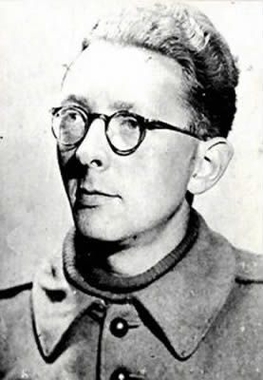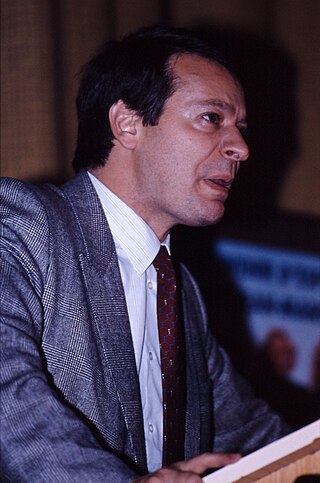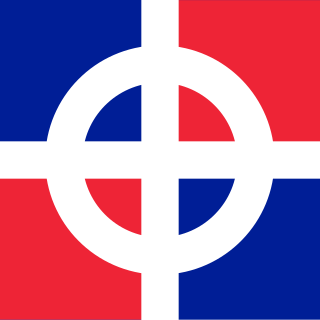
Groupe Union Défense, better known as GUD, was a French far-right students' union formed in the 1960s. After a period of inactivity it relaunched in 2022.
Roland Gaucher was the pseudonym of Roland Goguillot, a French far-right journalist and politician. One of the main thinkers of the French far-right, he had participated in Marcel Déat's fascist party Rassemblement National Populaire (RNP) under the Vichy regime. Sentenced to five years of prison for Collaborationism after the war, he then engaged in a career of journalism, while continuing political activism. One of the co-founders of the National Front (FN) in October 1972, he became a Member of the European Parliament (MEP) for the FN in 1986.
The Groupement de Recherche et d'Études pour la Civilisation Européenne, better known as GRECE, is a French ethnonationalist think tank founded in 1968 to promote the ideas of the Nouvelle Droite. GRECE founding member Alain de Benoist has been described as its leader and "most authoritative spokesman". Prominent former members include Guillaume Faye and Jean-Yves Le Gallou.
The Carrefour de l'Horloge, formerly Club de l'Horloge (1974–2015), is a French far-right national liberal think tank founded in 1974 and presided by Henry de Lesquen. The organization promotes an "integral neo-Darwinist" philosophy, characterized by a form of economic liberalism infused with ethnic nationalism.

The French and European Nationalist Party was a French nationalist militant organization active between 1987 and 1999. Led by Claude Cornilleau until 1996, its slogan was "France first, white always". It had around a thousand sympathizers at its height.

François Duprat was a French essayist and politician, a founding member of the Front National party and part of the leadership until his assassination in 1978. Duprat was one of the main architects in the introduction of Holocaust denial in France.
The far-right tradition in France finds its origins in the Third Republic with Boulangism and the Dreyfus affair. In the 1880s, General Georges Boulanger, called "General Revenge", championed demands for military revenge against Imperial Germany as retribution for the defeat and fall of the Second French Empire during the Franco-Prussian War (1870–71). This stance, known as revanchism, began to exert a strong influence on French nationalism. Soon thereafter, the Dreyfus affair provided one of the political division lines of France. French nationalism, which had been largely associated with left-wing and Republican ideologies before the Dreyfus affair, turned after that into a main trait of the right-wing and, moreover, of the far right. A new right emerged, and nationalism was reappropriated by the far-right who turned it into a form of ethnic nationalism, blended with anti-Semitism, xenophobia, anti-Protestantism and anti-Masonry. The Action française (AF), first founded as a journal and later a political organization, was the matrix of a new type of counter-revolutionary right-wing, which continues to exist today. During the interwar period, the Action française and its youth militia, the Camelots du Roi, were very active. Far right leagues organized riots.

Jeune Nation was a French nationalist, neo-Pétainist and neo-fascist far-right movement founded in 1949 by Pierre Sidos and his brothers. Inspired by Fascist Italy and Vichy France, the group attracted support from many young nationalists during the Algerian war (1954–62), especially in the French colonial army. Promoting street violence and extra-parliamentarian insurrection against the Fourth Republic, members hoped the turmoils of the wars of decolonization would lead to a coup d'état followed by the establishment of a nationalist regime. Jeune Nation was the most significant French neo-fascist movement during the 1950s; it gathered at its height 3,000 to 4,000 members.

Jean-Yves Le Gallou is a French politician. He served as a member of the European Parliament from 1994 until 1999, representing the National Front. Since 2022, he has been a member of Reconquête.

René Binet was a French fascist political activist. Initially a Trotskyist in the 1930s, he espoused fascism during World War II and joined the SS Charlemagne Division. Soon after the end of the war, Binet became involved in numerous neo-fascist and white supremacist publications and parties. He wrote the 1950 book Théorie du racisme, deemed influential on the European far-right at large. Binet died in a car accident in 1957, aged 44.

Jean-Pierre Stirbois was a French far-right politician. Elected deputy mayor in 1983 of Dreux, a city of around 30,000 inhabitants at the time, he was one of the main architects, along with his wife Marie-France Stirbois, of the first electoral breakthrough of the National Front.

Dominique Venner was a French historian, journalist, and essayist. Venner was a member of the Organisation armée secrète and later became a European nationalist, founding the neo-fascist and white nationalist Europe-Action, before withdrawing from politics to focus on a career as a historian. He specialized in military and political history. At the time of his death, he was the editor of the La Nouvelle Revue d'Histoire, a bimonthly history magazine.

Pierre Sidos was a French far right nationalist, neo-Pétainist, and antisemitic activist. One of the main figures of post-WWII nationalism in France, Sidos was the founder and leader of the nationalist organizations Jeune Nation (1949–1958) and L'Œuvre Française (1968–2013).

Terre et Peuple is a far-right and neo-pagan cultural association in France founded by Pierre Vial and launched in 1995. Its positions are close to the Identitarian movement, although it precedes that movement and its terminology.
The European Rally for Liberty, also translated as European Assembly for Liberty, was a far-right, white nationalist and euro-nationalist party active in France between 1966 and 1968, and the political showcase of the Nationalist Movement of Progress, created nine months earlier. The movement and the party were founded by the euro-nationalist magazine Europe-Action, escorted by militants from the Federation of Nationalist Students.
Europe-Action was a far-right white nationalist and euro-nationalist magazine and movement, founded by Dominique Venner in 1963 and active until 1966. Distancing itself from pre-WWII fascist ideas such as anti-intellectualism, anti-parliamentarianism and traditional French nationalism, Europe-Action promoted a pan-European nationalism based on the "Occident"—or the "white peoples"— and a social Darwinism escorted by racialism, labeled "biological realism". These theories, along with the meta-political strategy of Venner, influenced young Europe-Action journalist Alain de Benoist and are deemed conducive to the creation of GRECE and the Nouvelle Droite in 1968.

L'Œuvre Française, also called L'Œuvre, was a French nationalist, néo-Pétainist and antisemitic far-right movement founded in 1968 by Pierre Sidos. Inspired by the "semi-fascist" regimes of Vichy France, Francoist Spain and the Estado Novo, L'Œuvre Française was—until its dissolution by the authorities in 2013—the oldest nationalist association still active in France.
Yvan Benedetti is a French far-right activist. The former president of L'Œuvre Française (2012–13), he has been the spokesman of The Nationalists since 2015.
Pierre Bousquet was a French journalist and far-right politician. A former section leader (Rottenführer) in the Waffen-SS Charlemagne Division, Bousquet was the first treasurer and a founding member of the National Front in 1972.

Jean-Claude Valla was a French journalist and a prominent figure of the Nouvelle Droite.













